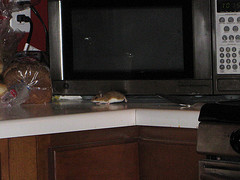Unsavory Facts About (Ugh!) Mice
 Many people have an instinctive dread of the house mouse, despite its small size and unaggressive behavior. Fear of house mice is actually a very appropriate reaction, though, because they often carry disease. Contact with the urine, droppings or saliva of infected mice; mouse-contaminated food;or bites from the fleas they carry can spread serious illness -- salmonellosis, listeria, hantavirus and even the bubonic plague. That's why you should keep mice out of your home if at all possible and get rid of them ASAP when they do find their way inside.
Many people have an instinctive dread of the house mouse, despite its small size and unaggressive behavior. Fear of house mice is actually a very appropriate reaction, though, because they often carry disease. Contact with the urine, droppings or saliva of infected mice; mouse-contaminated food;or bites from the fleas they carry can spread serious illness -- salmonellosis, listeria, hantavirus and even the bubonic plague. That's why you should keep mice out of your home if at all possible and get rid of them ASAP when they do find their way inside.
When Do Mice Infest Human Residences?
Contrary to its name, the house mouse tends to live in fields or forests. However, these rodents invade 21 million American homes annually when the weather gets cold or their food supply is disturbed, especially in the case of exceptionally severe weather conditions. One side effect of 2012’s devastating Hurricane Sandy was large numbers of displaced mice, which sought food and shelter inside human dwellings in New York and New Jersey. Newark rodent control was a serious concern.
Stacks of firewood, compost heaps and untrimmed grass or bushes next to your house are the perfect hiding place for mice, and from there it’s only a hop, skip and a jump inside. Set up woodpiles and compost heaps away from your home (minimum 20 feet) and keep all foliage well groomed. Do not allow debris to pile up near your home.
What Are the Signs of Infestation?
If your home does become infested, unless you are in total denial it won’t take long to find out. Mice leave abundant evidence of their presence, including shredded paper, gnawed wires, the smell of urine and droppings that resemble pointed black grains of rice. (BTW, the average mouse can scatter as many as 80 droppings throughout your home every day – yuck!) Even if you don’t actually come across a mouse nest, you're likely to hear rustling and squeaking in the walls, particularly at night. When you're hosting a sizable rodent population, you may even encounter a bold mouse out exploring your living room.
What Do Mice Eat?
Surprisingly, cheese is not their favorite food. Mice love grain, cereals and baked goods such as bread and crackers. They also have a fondness for chocolate. If you are baiting traps, strong-smelling foods such as bacon or peanut butter are recommended. Because mice are capable of chewing through materials ranging from paper to plastic, it is best to store any foods with mouse appeal in glass or metal containers – or in the fridge.
Is it Possible to Have Just One Mouse in My Home?
Although you might wish it were otherwise, you will almost never find “only one mouse” in a home. Females mature at the age of 2 months and produce approximately 8 litters of a dozen pups, as their young are called, annually. That’s about 100 in total every year!
What Are Some Unsuccessful Mouse Control Methods?
Housecats are not an effective means of mouse control. In fact, mice often are attracted to leftover food in or around your pet’s dish. (They also enjoy spilled birdseed and dry dog food.)
Glue traps are another inadvisable method of dealing with a mouse infestation. While at first glance they may seem more humane than snap traps, you are left with the problem of handling a flimsy contraption stuck tight to a terrified, angry rodent which is very much alive.
What Does Work to Get Rid of Mice?
Poisoned bait, snap traps and “catch and release” traps (one of which is even approved by PETA) are successful ways to get rid of house mice. If you set out poisoned bait, be sure to place it next to the wall or other edge, where mice like to travel, and keep it out of reach of children and pets. To prevent further problems, stop mice from getting back inside. Hire a handyman to cover exterior vents with metal screening and seal up other potential mouse entry points – for example, cracks in your foundation and gaps under exterior doors.
Laura Firszt writes for Networx.com.
Updated December 24, 2018.
Looking for a Pro? Call us (866) 441-6648

Pest control Average Costs
Exterminators Experiences

Mouse Control Got Rid Of A Small But Pesky Problem

Mouse Control Included Traps And Exclusion



